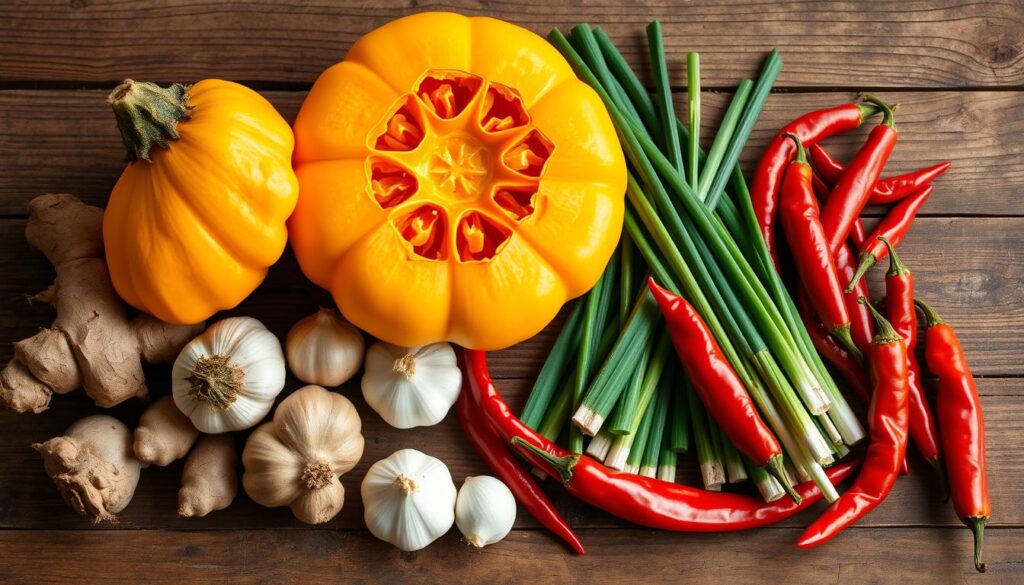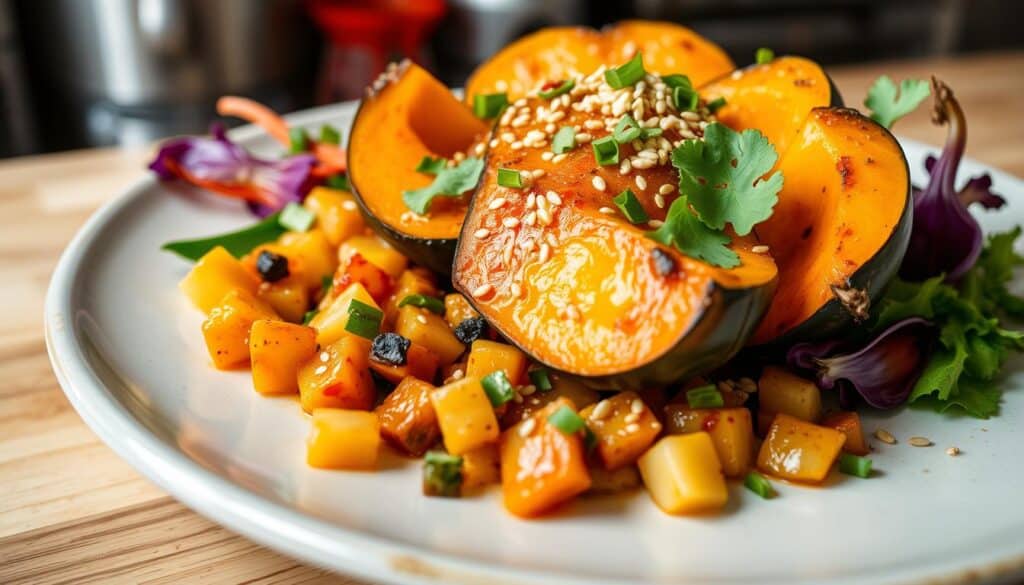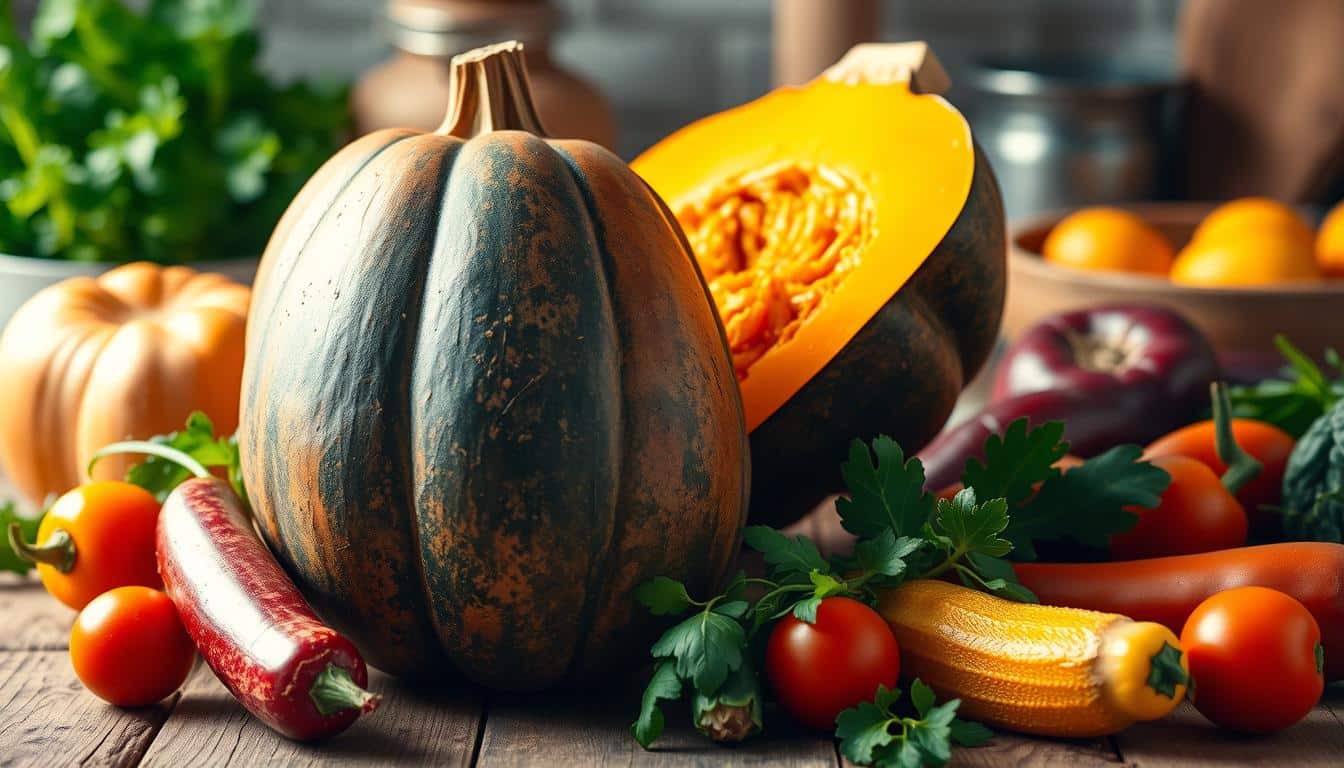As the air gets crisp and leaves change color, we start to crave warm, comforting foods. A steaming bowl of Chinese-inspired squash dish is perfect for this time of year. And the best part? You can enjoy these flavors in a vegan-friendly way.
Our collection of Chinese kabocha squash recipes is all about plant-based ingredients. Kabocha, or Japanese pumpkin, is a winter squash loved for its sweet taste and smooth flesh. Let’s dive into how to use this Asian winter pumpkin in vegan-friendly Chinese dishes.
Key Takeaways
- Discover the nutritional benefits and health properties of kabocha squash, a beloved Asian winter pumpkin.
- Learn how to select, store, and prepare kabocha squash for a range of vegan-friendly Chinese recipes.
- Explore traditional Chinese squash dishes, from braised kabocha in soy sauce glaze to stir-fried kabocha with ginger and garlic.
- Discover fusion-style kabocha squash preparations that blend classic Chinese flavors with plant-based ingredients.
- Enjoy quick and easy kabocha side dishes, including sesame-glazed, steamed, and crispy roasted variations.
Understanding Kabocha Squash: The Asian Winter Pumpkin
Kabocha squash is a key ingredient in Asian cooking. It’s a dark green, squat squash with a sweet, dry flesh. This makes it great for asian pumpkin recipes, kabocha squash dishes, and vegetarian gourd recipes.
Nutritional Benefits and Health Properties
Kabocha squash is packed with vitamins A and C, fiber, and antioxidants. It has fewer calories and carbs than butternut squash. This makes it perfect for those watching their diet. Its dry texture also makes it filling and satisfying.
How to Select and Store Kabocha Squash
Choose a kabocha squash that’s heavy for its size and has a deep green color. Avoid any with soft spots or blemishes. Store it in a cool, dry place like a pantry or cellar for weeks.
Preparing Kabocha for Cooking
Start by washing the kabocha squash well. The skin is edible and full of nutrients, so no need to peel it. Cut it in half, remove the seeds, and chop or slice the flesh. You can roast, sauté, steam, or use it in soups and stews.
| Nutritional Information (per serving) | Value |
|---|---|
| Calories | 142 kcal |
| Carbohydrates | 19 g |
| Protein | 2 g |
| Fat | 8 g |
| Fiber | 3 g |
“Kabocha squash is a true hidden gem in the world of winter squashes. Its unique flavor and versatility make it a must-try for anyone who loves asian pumpkin recipes, kabocha squash dishes, or vegetarian gourd recipes.”
Essential Ingredients for Chinese Kabocha Squash Recipes – Vegan Style
Creating tasty vegan Chinese dishes with kabocha squash needs a few key ingredients. Soy sauce or tamari adds a savory, umami taste. Rice wine brings a subtle complexity. Sesame oil adds a nutty richness.
Ginger and garlic give a flavorful punch. To make dishes without meat, use tofu or tempeh. Spices like five-spice powder, gochugaru, and miso paste add depth.
Creamy sauces are made with coconut milk or vegetable broth. They match the kabocha’s natural sweetness. Scallions add freshness. Sesame seeds or nuts add texture.
Using these ingredients, home cooks can make a variety of meat-free kabocha dishes. These dishes show off the squash’s versatility and offer a fulfilling meal.

“The secret to delicious vegan Chinese kabocha dishes lies in balancing savory, sweet, and aromatic flavors to create a harmonious, satisfying meal.”
Traditional Chinese Squash Recipes Kabocha Vegan
Discover the sweet and versatile side of kabocha squash in these Chinese-inspired vegan recipes. Enjoy the Braised Kabocha in Soy Sauce Glaze and the Stir-Fried Kabocha with Ginger and Garlic. These dishes highlight how well the squash takes on different flavors.
Braised Kabocha in Soy Sauce Glaze
This classic dish uses a glaze of soy sauce, rice wine, and sesame oil. The squash cooks until soft, soaking up all the flavors. Try it over steamed rice for a cozy meal.
Stir-Fried Kabocha with Ginger and Garlic
This quick stir-fry is a hit. It’s made with kabocha, ginger, garlic, and scallions. The squash becomes a vibrant, tasty side or main dish.
Five-Spice Roasted Kabocha
Try roasting kabocha with five-spice for a crispy, fragrant dish. The spices of cinnamon, star anise, and more add a unique taste. It’s a mix of textures and tastes.
“The natural sweetness of kabocha squash pairs beautifully with the bold, aromatic spices of Chinese cuisine. These recipes allow the versatile vegetable to shine in a variety of preparations.”
Fusion-Style Kabocha Squash Preparations
Explore fusion-style Kabocha squash dishes that mix traditional Chinese flavors with global tastes. Try Kabocha Squash Curry with coconut milk and red curry paste. Or, enjoy Tofu Kabocha Bowls with a tasty tahini dressing. These recipes show how versatile this Asian-inspired winter squash is.
Kabocha squash’s sweet and nutty flavor is great for bold, international flavors. We’ll see how to use its natural ability to soak up rich sauces and spices. This makes for unique, plant-based meals that everyone will love.
- Kabocha Squash Curry: A creamy, aromatic curry that marries the earthy sweetness of Kabocha with the complexity of coconut milk and red curry paste.
- Tofu Kabocha Bowls: Roasted Kabocha squash and crispy tofu served over a bed of greens, drizzled with a tangy tahini dressing for a nutritious and satisfying meal.
- Kabocha Squash Dumplings: A fusion of Chinese and global flavors, these dumplings showcase Kabocha’s versatility in both savory and sweet preparations.
These innovative Kabocha squash dishes show that asian inspired squash cuisine is both tasty and healthy. Discover the endless culinary possibilities of this versatile Asian winter pumpkin. It’s a star in tofu kabocha bowls and other fusion-style dishes.

Quick and Easy Kabocha Side Dishes
Kabocha squash is loved in many quick and easy side dishes. These recipes show how great it is in vegan and vegetarian meals.
Sesame-Glazed Kabocha
Our Sesame-Glazed Kabocha is a hit for its sweet and savory taste. Kabocha cubes are coated in a sauce of soy sauce, rice vinegar, and maple syrup. They’re topped with sesame seeds for extra flavor.
This dish is ready in just 30 minutes. It’s perfect for any meal.
Steamed Kabocha with Asian Aromatics
Our Steamed Kabocha with Asian Aromatics is light and fragrant. Kabocha cubes are steamed until soft. Then, they’re mixed with soy sauce, miso, garlic, and ginger.
This dish is delicate and full of umami. It highlights the natural sweetness of the vegan winter squash.
Crispy Roasted Kabocha Wedges
Our Crispy Roasted Kabocha Wedges offer a nice crunch. Cubed kabocha is tossed in oil and seasoned with shichimi togarashi. Then, they’re roasted until golden and crispy.
These vegetarian gourd recipes are easy and delicious. They’re great with many main dishes.
These kabocha side dishes are great for weeknights or big feasts. They show how versatile this vegan winter squash is. Try them in your meals often.
Conclusion
Kabocha squash is a great find in Chinese vegan cooking. It’s good in many dishes, from old favorites to new twists. You can enjoy its sweet and creamy taste in simple or fancy ways.
This squash is full of good stuff like vitamins, minerals, and fiber. It’s tasty and healthy for plant-based meals. Try the chinese squash recipes kabocha vegan and asian pumpkin recipes to see what you can make.
Using kabocha squash opens up new flavors and health benefits in our food. Let’s cook and enjoy the tasty and healthy dishes it offers in our vegan meals.

